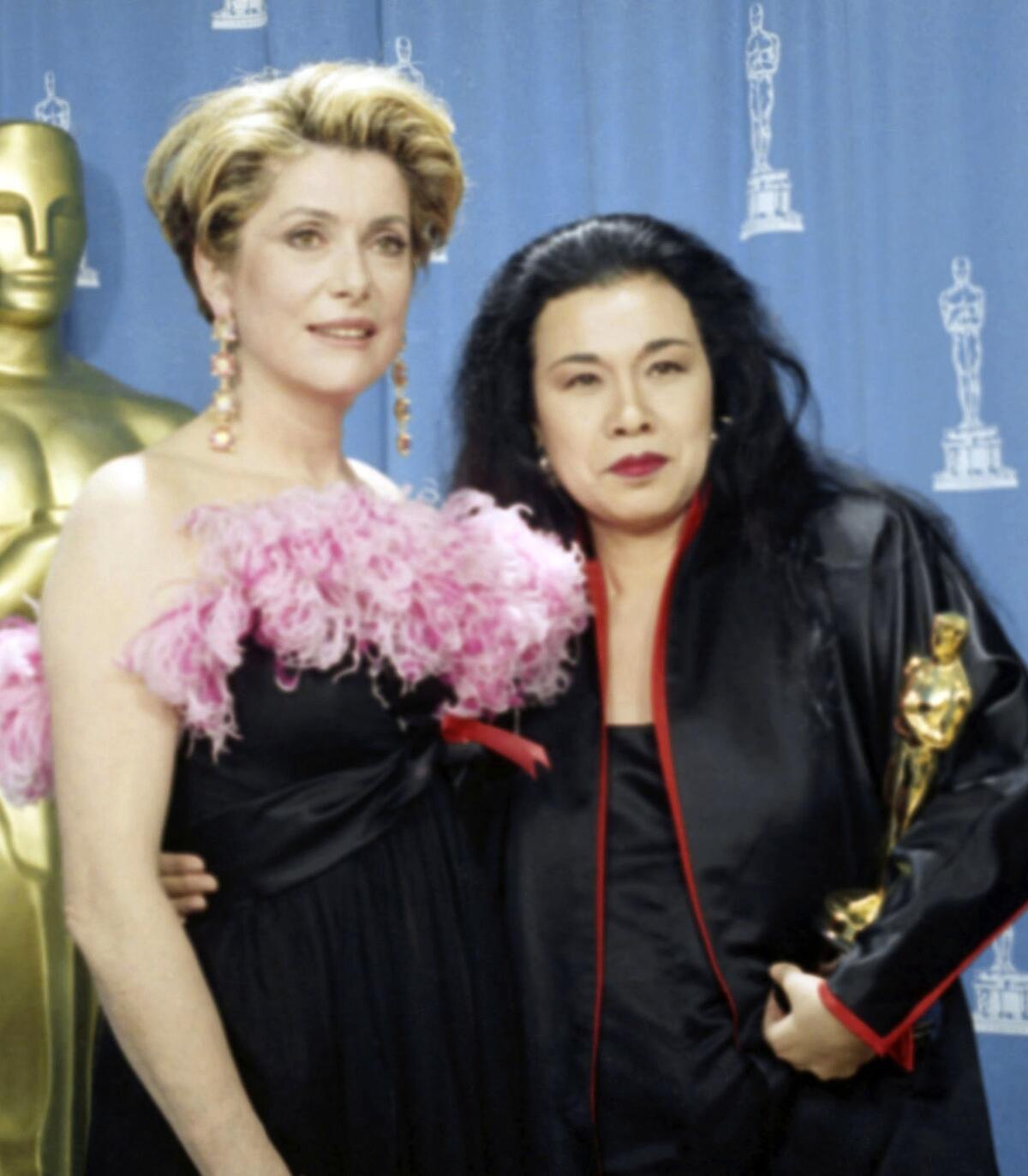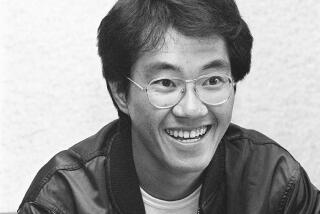Eiko Ishioka dies at 73; graphic designer and art director

As Japan’s preeminent graphic designer and art director in the 1970s and early ‘80s, Eiko Ishioka helped build her reputation by heading media campaigns for Parco, a major boutique shopping complex chain.
But instead of focusing on fashion or other merchandise in ads, promotional posters and commercials, Ishioka sold Parco to the public with attention-grabbing, often sensual visual images.
In one 15-second spot, a silver-haired British rake nonchalantly tosses his champagne glass overboard and makes his move on a dainty young Japanese woman. Then a voice-over says: “Life is short, the night is long.”
In a longer commercial, actress Faye Dunaway wearing black against a black background, silently gazes at the camera as she slowly peels a hard-boiled egg and then starts eating it as the camera moves in for a close-up.
Ishioka, 73, a longtime New York City resident whose convention-defying, award-winning career expanded in the 1980s to include design work for Broadway and the movies, died of pancreatic cancer Jan. 21 in Tokyo, said Tracy Roberts, her studio manager.
In a career marked by great versatility, Ishioka won a Grammy Award in 1986 for best album package as art director for Miles Davis’ “Tutu.”
Her sets and costumes for David Henry Hwang’s Broadway play “M. Butterfly” earned her two Tony Award nominations in 1988.
And after moving into feature films as the production designer on director Paul Schrader’s 1985 movie “Mishima: A Life in Four Chapters,” she went on to win an Oscar for costume design in 1993 for Francis Ford Coppola’s “Dracula.”
Her varied career also included designing the costumes for the Cirque du Soleil show “Varekai” in 2002. The same year she designed uniforms and outerwear for some members of the Japanese, Swiss, Canadian and Spanish teams for the Winter Olympics in Salt Lake City and directed a surreal music video for the Bjork single “Cocoon.”
In 2008, Ishioka was director of costume design for the opening ceremony of the Summer Olympics in Beijing.
Her other credits include serving as visual artistic director for “David Copperfield: Dreams and Nightmares” on Broadway in 1996 and designing the costumes for “Spider Man: Turn Off the Dark,” which is currently on Broadway.
Ishioka’s bold costume designs include a suit of molded leather armor for Jennifer Lopez in director Tarsem Singh’s 2000 film “The Cell,” a scarlet robe with a 22-foot train for Gary Oldman in “Dracula” and a hot pink costume with octopus-inspired appendages for Cirque du Soleil.
“I suppose you could say I’m obsessed with creating work that has never been seen before,” she told the New Zealand Herald in 2007. “When I design, I repeat it to myself often, like a mantra.”
“Eiko by Eiko,” a collection of her groundbreaking early work in graphic design and art direction, was published in 1983.
“Commercial work’s purpose is to sell merchandise,” sculptor Isamu Noguchi wrote of Ishioka in an essay in the book. “But Eiko used it to fight a battle, to move a message into society — to subvert consumerism.”
Ishioka’s 2000 book, “Eiko on Stage,” covered her work in film, opera and the theater. In the foreword, Coppola described Ishioka’s work as “breathtakingly original, strange and sensuous.”
Born in Tokyo on July 12, 1938, Ishioka showed an early talent for drawing. Her parents nurtured her creative spirit. Her father became a prominent commercial graphic designer, and her mother, “an ordinary housewife,” encouraged her to pursue an occupation, Ishiko told Canada’s Globe and Mail in 1984.
After graduating from Tokyo National University of Fine Arts and Music in 1961, she joined the advertising division of Japan’s largest cosmetics company, Shiseido. Four years later, she reportedly became the first woman to win Japan’s most prestigious advertising award.
Ishioka is survived by her husband, Nicholas Soultanakis, whom she married last year; her mother, Mitsuko Saegusa Ishioka; her brothers, Koichiro and Jun Ishioka; and her sister, Ryoko Ishioka.
More to Read
Start your day right
Sign up for Essential California for the L.A. Times biggest news, features and recommendations in your inbox six days a week.
You may occasionally receive promotional content from the Los Angeles Times.






